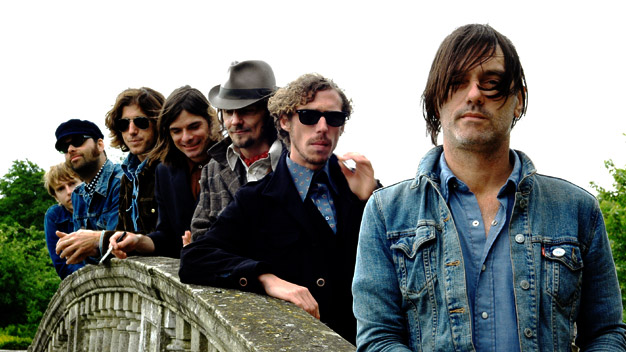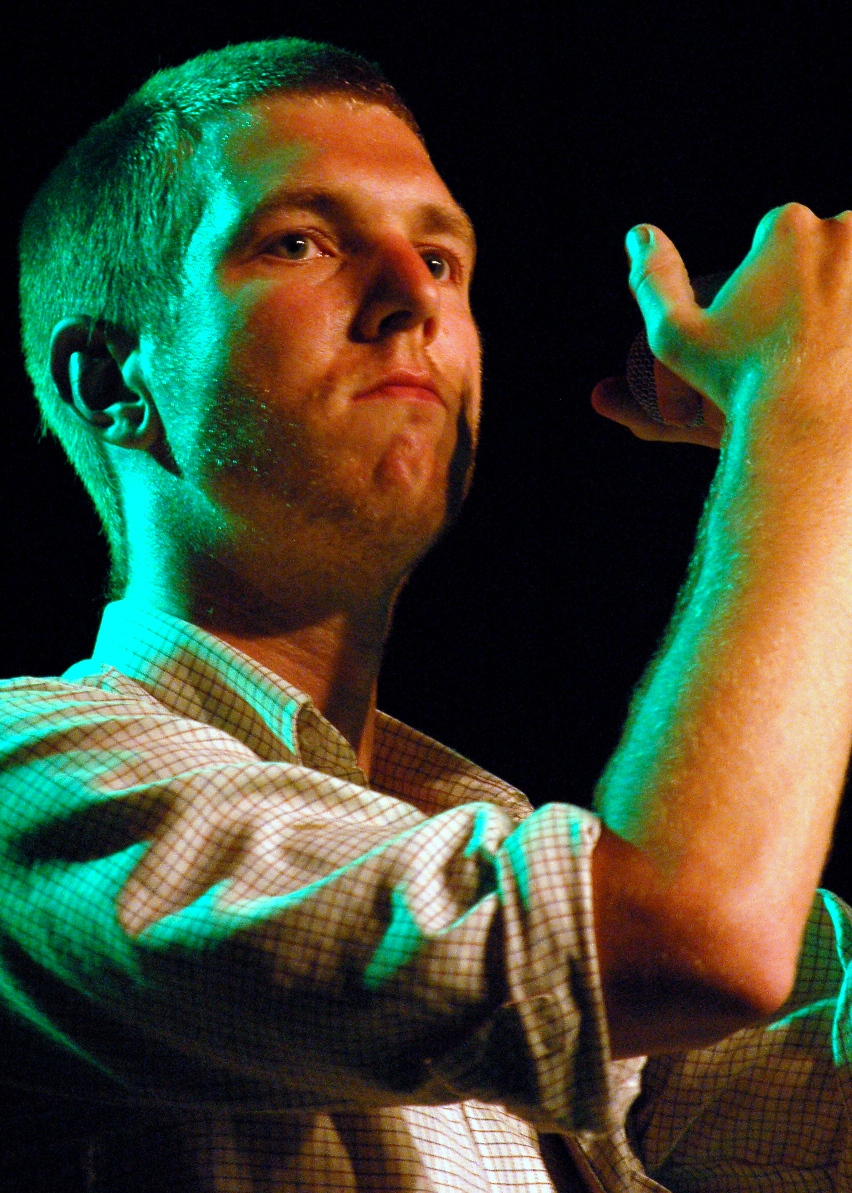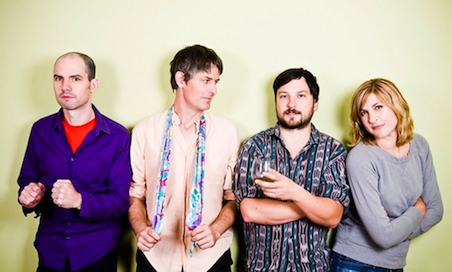The Avett Brothers – Sat., March 6, 2010 – Turner Hall Ballroom
| Event Details: | The Avett Brothers |
| When |
Saturday, March 6, 2010
|
| Where |
1032 N. 4th St
Milwaukee, WI |
| Other Info | [As posted by Turner Hall Ballroom Site] There is no harmony like brotherly harmony. Something indelible in the weave of voices and play of sensibilities is stamped into the fraternal DNA and also stems from a lifetime of shared experiences. You can hear it in classic brother acts across the musical spectrum, from the Louvin Brothers to the Everly Brothers and on down the decades through the Wilson brothers (Beach Boys), the Davies brothers (Kinks), the Allman Brothers and even the Brothers Gibb (a.k.a., the Bee Gees). You can clearly hear fraternal magic at work in the songs of Scott and Seth Avett, better known as the Avett Brothers, as well. That magic is abundantly evident on I and Love and You, the Avett Brothers’ big-label debut. Its 13 songs are delivered in a style that defies pigeonholing but might be described as a rootsy amalgam of folk, country, bluegrass, rock and pop – even a jab of punk-style dynamics here and there. Drawn by the naked honesty of their songs and the rousing intensity of their live shows, legendary producer and talent scout Rick Rubin signed the Avett Brothers – consisting of siblings Scott and Seth, plus bassist Bob Crawford - to his American Recordings label in 2008. “As soon as I heard the depth in their singing and songwriting, I was in for the ride,” says Rubin, who has worked with some of the most talented mavericks in the business, including Johnny Cash, Tom Petty and The Dixie Chicks. “The Avetts’ songs have such a sincere emotional resonance. The purity of the messages stops you in your tracks. It’s unusual to hear such open-hearted personal sentiment from young artists today.” For their own part, the Avett Brothers instantly felt at home in the studio with Rubin. “While growing up, his work influenced us in some weird way to do what we do, and it influenced our sound quite a bit, too. I mean, from the Beastie Boys to the Red Hot Chili Peppers to Johnny Cash, we explored all those records he did in depth. We felt comfortable working with someone we had faith in based on his credentials and track record. We wouldn’t be that way for anybody, we really wouldn’t.” By the time Rubin found them, the Avett Brothers had compiled their own impressive track record. They’d already issued five full length albums and two EPs, on their manager’s Ramseur Records label. They debuted in 2001 with a self-titled six-song EP and then issued a full-fledged album, Country Was, a year later. The heart of their catalog is the albums that followed: Mignonette (2004), Four Thieves Gone (2006) and Emotionalism (2007), which offered a generous 49 songs among them. The Avett Brothers’ latest release, an EP called The Gleam II, reached #82 on Billboard’s Top Albums chart in 2008 – quite a showing for an independent CD with minimal marketing and publicity. Over the years, the Avett Brothers built up a sizable following based on their rowdy, infectious stage shows. In concert, the high-flying ensemble tears through tunes with unbridled energy, popping banjo and guitar strings right and left while inciting stomping singalongs among audiences that appear to know every word. At times they would seemingly create their own subgenre onstage - “punkgrass,” for lack of a better word. This much is for certain: the Avett Brothers are a grassroots phenomenon, built from the ground up. I and Love and You marks the point at which they’re poised, with perfect timing, to break through to a broader audience. I and Love and You was rehearsed and recorded at the Document Room, located high on a hillside in Malibu, California. After cutting discs at various spots around their native North Carolina for eight years, the Avett Brothers were ready to take on the challenge of making an album at a top-of-the-line studio on the far side of the continent. The brothers were hardly unfamiliar with the Golden State, as they’d been visiting family in the Sacramento area since childhood and had gigged around California in recent years. But working with Rick Rubin in Malibu represented a giant step forward. “A benefit of making the record in California is that it switched everything up,” says Seth. “It helped put us in the mind set that we’re starting a new chapter. We’re looking to make a record in a different way than we have in the past, and we want to be open to these new methods. There’s no better way to try something new than to work in a place you’ve never been.” The results speak for themselves. From the 17 songs they cut with Rubin, 13 made the final cut. Rubin sequenced I and Love and You – the only time the Avetts have delegated that task to someone else. “This is the first time we have not been critical of the song sequence,” Scott noted approvingly. In fact, the Avett Brothers are rightfully proud of I and Love and You in every aspect. It is, they feel, an album they’ve been building toward. “Years ago, Seth had told me that he someday wanted to make a record where everything was as crisp and clear and well-produced as it could possibly be,” recalls bassist Crawford. “And with the help of Rick Rubin and [engineer] Ryan Hewitt, we’ve done that.” “It’s how I’ve always wanted our band to sound,” affirms Seth. “What I like is an absolute presentation of clarity. It’s not that I want to be glossy, and I don’t know that we ever could be glossy in the way that some pop artists are. But I love music you can grasp hold of because there’s no mistaking what the person is saying and presenting, and I feel like we’ve come the closest to that on I and Love and You.” Themes that recur on the album have to do with commitment, maturity, and moving forward through life with a positive outlook. I and Love and You has little to do with the ephemeral world of latter-day pop, even if several songs (notably “Kick Drum Heart” and “Slight Figure of Speech”) are tuneful and catchy enough to merit radio play. The Avett Brothers mean to create music of substance for the long haul. Seth Avett is just under thirty years of age while Scott is slightly over. A lot of what they’ve been writing about lately has to do with transitioning from youth to adulthood. You can hear this clearly on such songs as “The Perfect Space” and “Head Full of Doubt, Road Full of Promise,” thoughtful disquisitions that serve as the album’s thematic centerpieces. “It’s hard to tell where some of these songs are coming from and they can have many meanings,” Seth allows, “but I think on the whole the album makes some comment on the fact that we are young men, but that youth is fleeting and it goes by very quickly. When you’re moving out of your twenties and into this time when you’re hoping to build something, it’s a beautiful thing and a scary thing. It still feels like things are up in the air like they were in your twenties when everything was up in the air and you didn’t know what the hell was going to happen and who you were going to be. But during that time you start gaining the tools you’re going to use in the rest of your life.” The Avett Brothers have spent much of the past decade nurturing their skill as songwriters, along with their proficiency as vocalists and musicians. Although Seth and Scott are principally identified with acoustic guitar and banjo, respectively, from their live shows, both brothers also play piano, drums and most anything else with strings. (The brothers possess formidable artistic skills, too, and their sketches and paintings adorn their albums.) Clearly, however, songs are the center of the Avett Brothers’ universe. The brothers turn out songs in profusion. They write them individually, and they write them together. Each might write an entire song, or credit might be split down the middle or any conceivably fractional way. There is no set method to their songwriting. The point is, Seth and Scott generate songs constantly, because that’s what they feel that they were born to do. “There’s not an option,” explains Seth. “It feels like a living thing, and if we want to keep it alive, we have to nourish it. There are so many things we have to consider now - the stage show, business issues, our relationship to different people and our fans - but at the heart of it is the songwriting and the connection we have with ourselves and others through that writing. It’s an essential and imperative element to our existence.” “On top of all that, it’s just exciting,” Seth continues. “Scott and I and Bob get these new songs going, and that is our lifeblood. It’s obvious we’ve got to keep rolling with it. Whether the records come out or don’t come out, and whether there’s a market or not a market, the important thing is that we’re writing songs. They’re not just for a release date; they’re for posterity.” The Avett Brothers formed in 2001 in Charlotte, North Carolina when banjoist Scott Avett and guitarist Seth Avett joined forces with standup bass player Bob Crawford. At the time, the brothers fronted a neo-punk band called Nemo. They enjoyed blowing it out on electric instruments but eventually began feeling the tug of the acoustic music they’d heard growing up. They were raised in the textile town of Concord, about a half-hour north of Charlotte. Their dad, Jim Avett, had a box of eight-track tapes that Scott and Seth picked through, listened to and digested. It included albums by Bob Dylan, Neil Young, Crosby, Stills & Nash, and Jim’s own folksy duo, Common Decency. Other roots musicians from the folk and country realms filtered into their subconscious, too. Thus, in 2001, the brothers launched an acoustic side band, called Nemo Back Porch Project, for which they added upright bassist Crawford. He recalls the initial meeting with Scott and Seth: “They were wanting to do some of the music they were raised on via their dad, which was old songs by Rambling Jack Elliott, Kris Kristofferson, Hank Williams and Tom T. Hall. I met up with them on a Sunday night in an empty parking lot. I got out my bass, and these two guys showed up in a gold Ford Taurus station wagon wearing flannel shirts and cutoff pants. They were total grunge kids. We sat in the parking lot, just the three of us, and played ‘Going Down the Road Feelin’ Bad’ and ‘More Pretty Girls Than One.’ Then they showed me an original song called ‘Kind of in Love,’ and it was very interesting. It wasn’t like any of those traditional songs. Different chord structure, with all these minor substitution chords. I was like, ‘This is really unique.’” From there, Nemo’s acoustic sideshow blossomed into the main attraction, and the Avett Brothers were born out of it. Still and all, while they built up a loyal following around their home state in places like Charlotte, Greenville and Chapel Hill, they weren’t exactly setting the woods on fire beyond those pockets of regional fandom, and Scott and Bob forged ahead with plans to attend graduate school in the fall of 2002. However, there was one unfinished piece of business in Crawford’s mind. “I said, Listen guys, I’ve always wanted to go on the road with a band,’” Crawford recalls. “’If I book a tour, will you guys go? Can we just go on the road for a couple weeks this summer?’ And they were like, ‘People have said things like this to us before, but if you do it, we’ll do it.’” And so Crawford got on the Internet and booked a month-long 21-city tour. They camped out or slept in the truck when they couldn’t find a floor to sleep on, subsisted on peanut butter and banana sandwiches, and returned home with $4,000 and a flock of new fans in 21 cities. The Avett Brothers were off and running, and grad school got shelved. Live shows remain the Avett Brothers’ calling card. In the spring of this year, they opened selected dates for the Dave Matthews Band. On their own, they’ve filled a 7,000-seat venue in Cary, North Carolina, and sold out two nights at the Crystal Ballroom in Portland, Oregon – one of their strongholds. In June 2009, they performed back-to-back sellouts at New York’s Fillmore East. With I and Love and You, they’ve also taken a giant step forward on the recording front. Whereas they’d previously opted for a first-take freshness, now they wanted to proceed at a more deliberate pace, taking advantage of the options that Rubin’s wisdom, a bigger budget, a better studio and more time allowed them. In short, while they’d always tried to bottle their live magic in the studio, this time they set about making a more nuanced and well-crafted record. “We were totally up for spending more time on it,” says Scott. “As time goes on, you become more critical about your work. And the more critical you become, the more willing you are to explore the options. We did a lot of revising and reworking in the studio. For instance, it was like ‘Let’s try drums in this part.’ ‘No, that won’t sound good.’ ‘Well, how do you know, we haven’t tried it?’ ‘Okay, you’re right, let’s try it.’ There was a lot more of that going on.’” In harnessing the tools available to them in the service of the strongest set of songs they’ve written so far, the Avett Brothers have surpassed themselves on I and Love and You. There’s really no great secret or magic formula for what they’ve achieved here. It comes down to honoring inspiration with an awful lot of hard work. “The brothers have an incredibly strong work ethic,” affirms Rick Rubin, “and they continually worked at honing their craft. Hearing brothers who have sung their whole lives together – singing the truth – was a revelation each new day.” “We know what we’re worth, and we’ve been campaigning for a long time to be heard,” notes Scott without false modesty. “Rick is helping that by sitting up and saying, ‘Let me work with you.’ We can tip our hats and pat ourselves on the back momentarily and say, ‘Good job guys, we have been heard by somebody who’s been heard by a lot of people, and he’s let us in his camp.’ I really look at it as a positive thing and a good milestone. And when it comes time for the next step, we’ll do our best again and keep moving.” “We’ll just keep writing our songs and making our records, and how it goes is how it goes,” concludes Seth. “We’re trying our hardest and having some fun doing it, and that’s all it needs to be.” |







